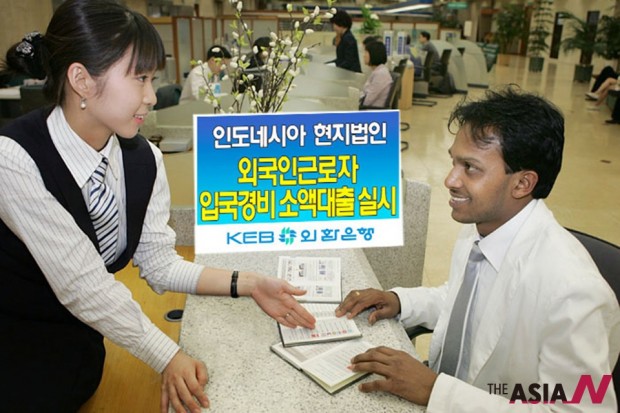Expats not satisfied with banking services

Indonesian field laborers who are supposed to work in Korea are able to get a short-term loan. (Photo : NEWSis)
Korean banks offer various services for foreigners, but many of these are not utilized due to a lack of promotion.
Even some fortunate individuals who received loans from Korean banks, including Mike Weisbart, a Canadian, say getting a loan is still a very challenging process, even for permanent residents.
“It’s very difficult to understand how Korean banks evaluate loan applications on the retail side when it comes to expats,” Weisbart said.
He said he has lived in Korea for more than 10 years and has bank accounts here for both personal and business purposes, though he declined to say which banks they are.
“I am one of the lucky ones because I’ve received financing. I visited lenders, but was rejected right away because I am a foreigner. Why? Because the banks just have no ways to evaluate my risk profile and they don’t want to manage all the paperwork of dealing with a foreigner,” he said.
Weisbart said such approaches and attitudes should be corrected.
“The most important thing that the Korean banks need to do if they want to serve the expat community is to develop ways to determine who is risky and who is not,” he said.
Rajesh Chandara Joshi, a Nepalese doctor, also said that Korean banks turend down his request when he applied for a loan to purchase a home in Daegu where he works.
“Some of them were major lenders, but they all were hesitant although I had collateral which was large enough to prove my financial credibility. I think it was so just because I’m a foreigner,” Joshi said.
A fluent Korean speaker, Joshi said he is worried that he may continue to take out loans from banks under the name of his Korean wife in the future whenever his family needs a large sum of money.
“I have children who will live here. That’s why I applied for naturalization after living here for more than 20 years. And I’m often afraid my wife will bear the financial burden whenever situations like these occur in the future,” the doctor said.
Pham Thi Quynh Hoa, a Vietnamese who works at Seoul Metropolitan Government, alleged that such challenges faced by foreigners in using Korean banks may stem from their “distrust” of non-Koreans.
“I once took my two children to banks to set up accounts for them, but the clerks just would not allow it,” said Pham, who has a permanent resident status.
“They even turned down my offer to submit a certificate for my family issued by a district office. I had to take my Korean husband to solve this problem.”
Pham said her Vietnamese friends — a number of them migrant workers — had difficulties in closing their installment savings accounts when they planned to return to their homeland.
“They told me the banks refused to close their five-year installment savings accounts although they insisted they will not return to Korea after leaving the country,” she said.
Pham, a resident in Seoul, also complained about the interpretation services at banks.
“The terminology for banking services is still difficult for me to understand,” she said.
Korean banks have expanded services for foreigners as the country is shifting toward a multicultural society — the number of expats hit a record high of 1.57 million last year.
The services offered by the country’s six major lenders — KB Kookmin, Woori, Shinhan, Korea Exchange Bank (KEB), Hana and NongHyup — vary from language services to extended office hours to loans.
For instance, KB Kookmin and Shinhan offers interpretation services in 10 and eight different languages, respectively, including English, Chinese, Japanese, Russian, Vietnamese and Indonesian. Each lender has 1.07 million and 400,000 expat customers. And interpretation is available via face-to-face, telephone, online and automated teller machines, according to the banks.
Woori runs a total of five branches in Seoul, Incheon as well as Suwon and Ansan in Gyeonggi Province, exclusively for foreign customers, especially migrant workers.
Last year, the lender also launched a private banking service at two of its Seoul offices in Yeoksam-dong and Myeong-dong, respectively, for asset management of wealthy foreigners.
KEB and Hana Bank, both affiliates of Hana Financial Group, operates 13 and four branches, respectively, on Sundays in cities such as Seoul, Ansan for Chinese people, Southeast Asians and other overseas manual laborers who normally work six days a week in those areas.
KEB also offers loans worth up to 30 million won ($28,300) to existing foreign clients without collateral if the applicants have records of regular income, have been a KEB customer for more than a year, and have a good credit rating. By Yi Whan-woo, The Korea Times

























































